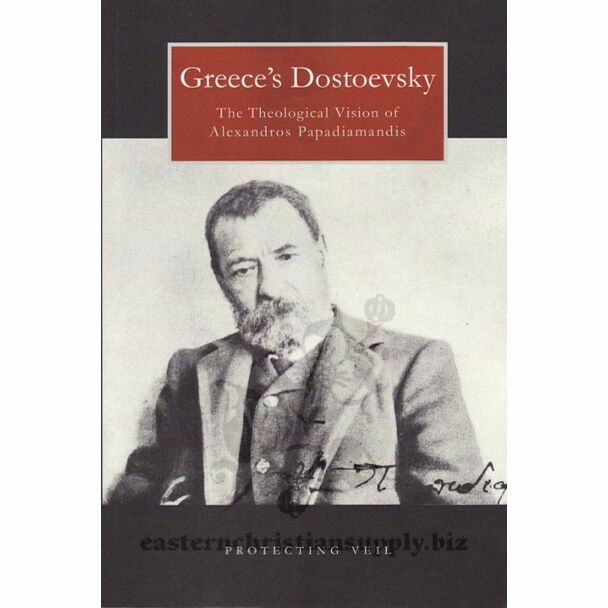Greece’s Dostoevsky: The Theological Vision of Alexandros Papadiamandis
Anestis Keselopoulos
Foreword by Hieromonk Alexis (Trader)
Translated from the Greek, compiled, edited, and with an introduction, notes, and glossary by Herman A. Middleton
Foreword by Hieromonk Alexis (Trader)
Translated from the Greek, compiled, edited, and with an introduction, notes, and glossary by Herman A. Middleton
Publication Data: Etowah, NC: Protecting Veil, 2011
Format: softcover
Number of Pages: 238
Dimensions (l × w × h): 22.9 cm × 15.3 cm × 1.6 cm
Additional Information: black-and-white illustrations
ISBN-13: 978‒1‒4637‒7023‒5
ISBN-10: 1‒4637‒7023‒5
Anestis Keselopoulos
Foreword by Hieromonk Alexis (Trader)
Translated from the Greek, compiled, edited, and with an introduction, notes, and glossary by Herman A. Middleton
“The question of the relationship between art and the spiritual life of Orthodox Christians is a topic that is both ancient and contemporary. The publication of Greece’s Dostoevsky provides an opportunity to revisit this question, for Alexandros Papadiamandis is an example of a faithful churchman who was also a dedicated artist. Orthodox thinkers have not thoroughly addressed this important issue, which affects Orthodox throughout the world, especially those living in a modern Western society increasingly influenced and informed by art.”
—“TRANSLATOR’S INTRODUCTION”
CONTENTS
TRANSLATOR’S INTRODUCTION
TRANSLATOR’S NOTES
FOREWORD: A Unique Witness to a Unique Opportunity
Liturgical Art and Life: East and West
Religious Fiction and Greece’s Dostoevsky
Some Significant Themes for Orthodoxy in America
INTRODUCTION
CHAPTER ONE: The Life and Work of Alexandros Papadiamandis
A Short Biography of Alexandros Papadiamandis
Papadiamandis’s Life and Work in the Context of Modern Greek Literature
CHAPTER TWO: The Clergy
Pastoral Service
Education and Liturgical Ethos
Economic Struggles
The Relationship Between Monastics and the Parish
Bishops
Liturgical Life: The Center of Pastoral Care
CHAPTER THREE: The Role of the Laity
Clergy-Laity Relations
The Laity as Liturgical Concelebrants
Religious Brotherhoods
Church and State, Church and World
CHAPTER FOUR: The Tradition of the Church
Biblical Tradition as Liturgical Tradition
Patristic and Synaxarian Tradition
The Hymnological Tradition, “The Songs of God”
Canonical Tradition
Eastern and Western Tradition
Diachronicity in Tradition
CHAPTER FIVE: Papadiamandis’s Liturgical Theology
Influences from the Monastic Typicon
Monastic Typicon in the Monastery
Monastic Influence on Parish Life
Papadiamandis and the Monastic Typicon
Papadiamandis’s Theology of the Divine Liturgy
Papadiamandis’s Theology of Confession
Papadiamandis’s Liturgical Realism and Freedom
Liturgical Precision and Economy
Form and Essence in Worship
Papadiamandis’s Liturgical Catechism
CHAPTER SIX: Art in Worship
The Meaning of Liturgical Art
The Theology of the Icon
Turning Liturgical Art into Museum Pieces
The Falsification of Liturgical Art
Church Hymnography and Music
SHORT STORIES
Without a Wedding Crown
A Village Easter
ENDNOTES
GLOSSARY
TRANSLATED TITLES OF PAPADIAMANDIS’S STORIES
MAP OF SKIATHOS
FORTHCOMING FROM PROTECTING VEIL
Format: softcover
Number of Pages: 238
Dimensions (l × w × h): 22.9 cm × 15.3 cm × 1.6 cm
Additional Information: black-and-white illustrations
ISBN-13: 978‒1‒4637‒7023‒5
ISBN-10: 1‒4637‒7023‒5
Anestis Keselopoulos
Foreword by Hieromonk Alexis (Trader)
Translated from the Greek, compiled, edited, and with an introduction, notes, and glossary by Herman A. Middleton
“The question of the relationship between art and the spiritual life of Orthodox Christians is a topic that is both ancient and contemporary. The publication of Greece’s Dostoevsky provides an opportunity to revisit this question, for Alexandros Papadiamandis is an example of a faithful churchman who was also a dedicated artist. Orthodox thinkers have not thoroughly addressed this important issue, which affects Orthodox throughout the world, especially those living in a modern Western society increasingly influenced and informed by art.”
—“TRANSLATOR’S INTRODUCTION”
CONTENTS
TRANSLATOR’S INTRODUCTION
TRANSLATOR’S NOTES
FOREWORD: A Unique Witness to a Unique Opportunity
Liturgical Art and Life: East and West
Religious Fiction and Greece’s Dostoevsky
Some Significant Themes for Orthodoxy in America
INTRODUCTION
CHAPTER ONE: The Life and Work of Alexandros Papadiamandis
A Short Biography of Alexandros Papadiamandis
Papadiamandis’s Life and Work in the Context of Modern Greek Literature
CHAPTER TWO: The Clergy
Pastoral Service
Education and Liturgical Ethos
Economic Struggles
The Relationship Between Monastics and the Parish
Bishops
Liturgical Life: The Center of Pastoral Care
CHAPTER THREE: The Role of the Laity
Clergy-Laity Relations
The Laity as Liturgical Concelebrants
Religious Brotherhoods
Church and State, Church and World
CHAPTER FOUR: The Tradition of the Church
Biblical Tradition as Liturgical Tradition
Patristic and Synaxarian Tradition
The Hymnological Tradition, “The Songs of God”
Canonical Tradition
Eastern and Western Tradition
Diachronicity in Tradition
CHAPTER FIVE: Papadiamandis’s Liturgical Theology
Influences from the Monastic Typicon
Monastic Typicon in the Monastery
Monastic Influence on Parish Life
Papadiamandis and the Monastic Typicon
Papadiamandis’s Theology of the Divine Liturgy
Papadiamandis’s Theology of Confession
Papadiamandis’s Liturgical Realism and Freedom
Liturgical Precision and Economy
Form and Essence in Worship
Papadiamandis’s Liturgical Catechism
CHAPTER SIX: Art in Worship
The Meaning of Liturgical Art
The Theology of the Icon
Turning Liturgical Art into Museum Pieces
The Falsification of Liturgical Art
Church Hymnography and Music
SHORT STORIES
Without a Wedding Crown
A Village Easter
ENDNOTES
GLOSSARY
TRANSLATED TITLES OF PAPADIAMANDIS’S STORIES
MAP OF SKIATHOS
FORTHCOMING FROM PROTECTING VEIL
Write Your Own Review





